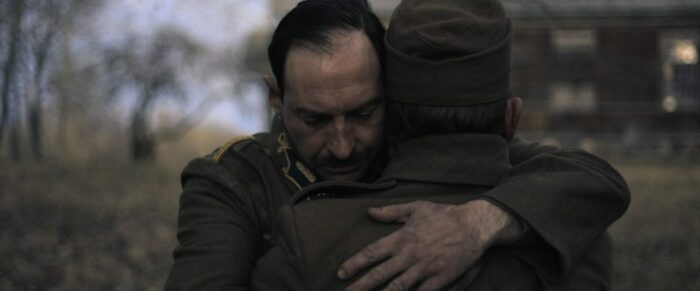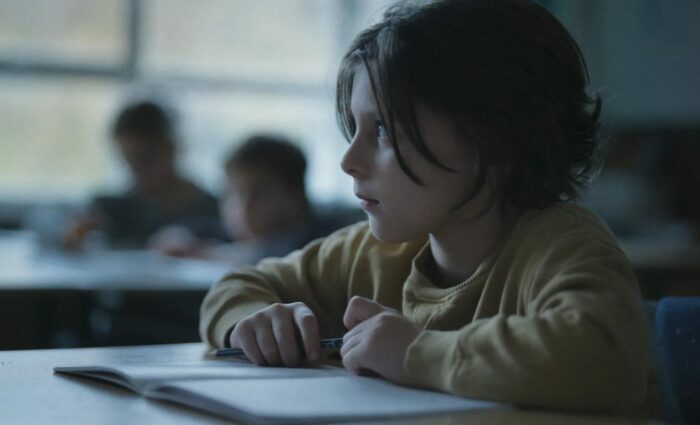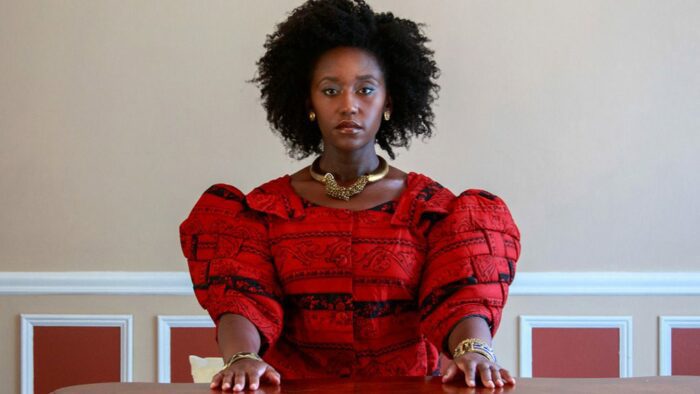This article is part of a series covering the films released at the 2021 BFI London Film Festival; previous entries in this series can be found on this site.
Natural Light

When I think of the war movies I consider the most admirable, they are the ones that emphasise the insanity, (Dr Strangelove) the trauma (Come and See), the fear and the boredom (Das Boot) of war. Natural Light is a film after the same tradition as those films, set in the brutal period where Hungarian forces occupied Soviet Russia on behalf of the Nazis. The world of partisans versus occupants is that of many of the most harrowing depictions of war, in not only the aforementioned Come and See, but other films in a similar vein. As history has recorded, the war was mostly enacted upon the civilian population, with each side hoping to starve their opponents of local support through murderous reprisal, that’s what makes films about these events feel especially cruel and upsetting.
Director Denes Nagy’s film looks at the conflict from a somewhat new perspective, focusing on Istvan Semetka (Ferenc Szabo), a lieutenant in the Hungarian army, whose detachment is assigned with patrolling the Soviet wilds, searching for Partisans and their collaborators among the surrounding villages. When his detachment establishes a temporary headquarters in one such village, Semetka becomes fixated upon a young woman named Alina (Anastasija Jegorova), and finds himself conflicted when his commander is killed in an ambush and he is left to make an example of the villagers believed to have betrayed them to the enemy.
The film’s most brutal moments are left off-screen, thankfully, as I believe the time for the kind of direct depiction presented by a film like Come and See—of which this film has notable echoes—has passed. This leaves Nagy’s film with a more muted and ruminative take on the capacity to be accessory to evil as the morally weak-minded Semetka maintains his passive capitulation to the will of the monstrous chain of command. There are occasionally striking tableaux, and a canny edit as a damp stain soaks through their map and we cut to the troops marching through rain—by curious coincidence, both this and the next film Playground share the same editor Nicolas Rumpl—but there’s not much fresh in the film’s take on the occupation as viewed by the occupiers.
Szabo’s stoic performance seems misplaced, remaining too much of a blank canvas for anything really interesting to play out across. That’s why the film seems to fail so much as a character study, and doesn’t really manage to say anything that interesting about its history. Vacancy is a hard characteristic to make compelling and thematically, it’s a rather malnourished piece, lacking much poetry or character. It could’ve dragged itself out longer, but the point is certainly made, though I think it could have been made more creatively. Perhaps it finds a close companion piece from this year’s festival in Azor, a film that also explores how genocides are built on the backs of weak, self-serving men more than they are those of evil ones. Natural Light is perhaps the more engaging film of the two thanks to its generic setting, but Azor has lingered with me longer. I was rather bored by both, but I was in both cases glad to have seen them and felt as if I’d understood them to my own satisfaction.
Playground

It’s extraordinary how mundane and normalised bullying is, how it’s something we accept as a part of life and just put up with as kids. It’s a sore subject for me as I was bullied throughout my childhood and early adolescence. It taught me to avoid other people wherever possible and set my social development back many years, but to my knowledge, nothing was ever done about it by my schools except enable that isolation. My tormentors never faced any consequences and it was always my reaction that was treated as the problem. So I can testify to the frustration this film explores. Important films have been made about bullying—I’d cite A Silent Voice as an unmissable example – but it’s something more commonly treated as an easy setup for something else: the high-school bullies in horror there to feed the monster for some easy, guilt free gore.
Rather than bullying as a social malady, Laura Wandel’s Playground is more a film about how bullying impacts families and how the age gap separates formerly close siblings when they enter the unforgiving social strata of a school environment. Their different levels of innocence splits their methods of dealing with things. When she starts her first week of primary school, the innocent young Nora (Maya Wanderbeque) is shocked and perplexed to discover that not only is her brother Abel (Gunther Durat) a very different person when he’s at school, but he’s also being bullied relentlessly by a group of older kids. Nora insists he tell someone and stand up for himself, but Abel insists on staying silent and keeping his distance from Nora, whose neediness is just a further embarrassment at this age. Nora tries to question and challenge things, while her already cowed and dominated brother Abel just tries to avoid notice and wait for the bullying to stop on its own. Neither sees much reward for their pain.
Despite the upset the film is dealing with, there is some redemptive empathy provided by Nora’s sympathetic teacher Mrs Ayers (Laura Verlinden) who, despite her inability to treat the cause, does provide some salving moments of kindness to the lonely and freshly disillusioned Nora. The young cast do pretty well but there are some things its almost impossible to fake, particularly when working with children and at only seventy two minutes in length, the film could really have used a longer first act to establish what kind of relationship Nora and Abel have before seeing it tested so cruelly. Like some breakup dramas, the emotional impact the film is going for just doesn’t materialise because we don’t have the chance to invest in the relationship when it was working for both characters. If we don’t see the happiness, we can’t share in grieving its loss.
The film’s original French language title “un monde” hints at a more allegorical reading, but though the film does sometimes encourage such interpretation with recurring imagery associating the school sandpit with the deepest depths of the ocean and all that connotes, the film itself is pretty direct and needs no such metaphors to make its more potent points. I prefer this more unpretentious title, and think it better fits the character of the more realist film we’re experiencing. It’s a sad, empathetic and sometimes shocking piece but it doesn’t have that depth of character and sense of focused realism to become something truly absorbing and memorable.
Queen of Glory

Much like Hinterland one of the films of the festival I was more looking forward to, not so much because I expected great things from it, but more because I was in need of the change up from the standard festival fare that it seemed to promise, was Queen of Glory, an actual comedy! Sadly though, Queen of Glory failed to provide the laughs one would hope, though not through lack of trying.
I’ve often stated that the comic-drama, autobiographical star vehicle set in New York, about a creative undergoing a quarter-life crisis, is the most oversaturated of extremely specific subgenres. In this case, it’s Nana Mensah in the driving seat as writer, director and star as Sarah Obeng, a Ghanian-American mollecular neurologist living in Manhattan whose plans to move to Ohio are upset by the sudden death of her mother, leaving her with not only a traditional Ghanian funeral to prepare but a Christian bookstore on her hands, forcing her to get back in touch with her Ghanian roots, if only superficially. This in itself isn’t a novel innovation within this sub-genre, for a similar comic drama about balancing the expectations of a traditional immigrant family with one’s own western ambitions, one could look to Desiree Akhavan’s far sharper dissection of identity politics Appropriate Behaviour. In comparison, Queen of Glory‘s provides only shallow sitcom-level observations about her boorish dad being unable to work the remote and Sarah not knowing how to cook.
The film-making is also distinctly amateurish, more so than one would have expected for a film screening at an international festival, with dry cinematography and scene transitions straight out of a TV studio comedy. Mensah shows no real affinity for drama or for comedy, and nor do the rest of the cast. The only vaguely memorable performance comes from Meeko Gattuso as the ex-con employed at the bookstore (Gattuso has his real name tattooed on his face). He’s a novel and stereotype-busting creation but still isn’t given much funny to do and the film’s messages are nothing but the most trite platitudes, including the pregnant supporting character who suddenly goes into labour to give us some drama heading into the third act.
The film attempts to give us some sense of the weight of tradition weighing upon Sarah’s shoulders, but in the laziest ways: having people tell her what to do and intercutting stock footage of Ghanian rural life and culture. The climactic funeral scene is a potent moment that feels like it was the central image the rest of the film was engineered to manifest. Ultimately, Queen of Glory just doesn’t feel like it comes together to be anything that profound, original or even diverting.



